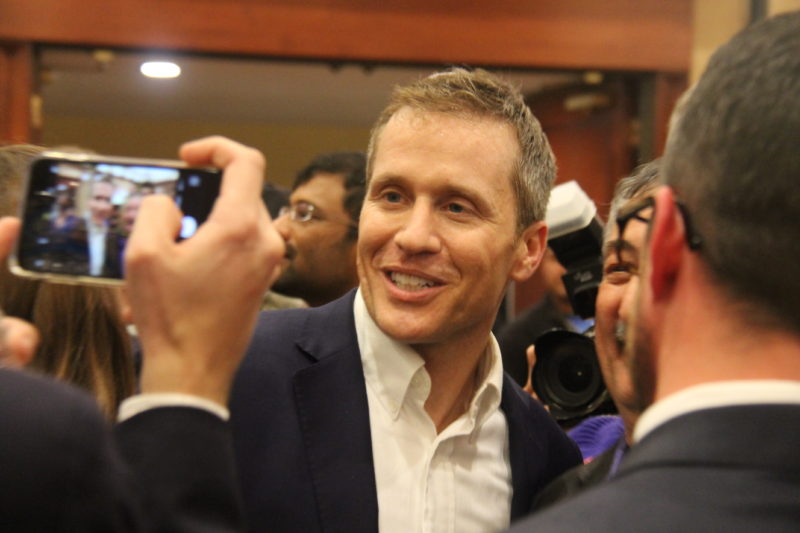JEFFERSON CITY, Mo. – Missouri’s battle against budget cuts just seems to worsen, and it could mean bad news for the next governor.
Missouri’s revenue has fallen short of the projections, and it could mean that Gov.-elect Eric Greitens’ first day could be a long one.
“If Gov. Nixon doesn’t make any more restrictions before he leaves office, it’s going to leave Gov. Greitens with that responsibility when he takes office,” Rep. Scott Fitzpatrick said.
He’s taking over as the next chairman for the House budget committee, and says that unless Gov. Nixon cuts the budget or there’s an explosive growth in revenue, it’s likely that the governor-elect will be faced with major decisions on his first day.
But all roads seem to lead in one direction for the incoming administration: tackling a multi-million dollar budget shortfall. That means that one of the first things Greitens may have to do is cut hundreds of millions of dollars, which could impact education, economic development, and a number of statewide programs.
Fitzpatrick estimates the state’s budget shortfall in the realm of $200 million, and says that when lawmakers head to Jefferson City for the start of the legislative session, they’ll be tackling one of the most challenging budget cycles he has seen since he was first elected in 2012.
There are a number of reasons behind the state’s budget troubles. The state’s $27 billion budget for the 2016 fiscal year was based on a projected three percent growth in state tax collections. But instead of three percent, the growth rate has reached just 0.9 percent, thanks in part to tax refunds and a decline in corporate taxes.
“When we went in last year and estimated what we thought the revenues were going to be for FY 2016, we expected to grow about three percent, which is a pretty reasonable estimate,” Fitzpatrick said. “When we finished 2016 at less than one percent, it basically created a shortfall at the end of the year of about $200 million. As a result of that, we started the year with $200 million less in cash than we had anticipated in the general fund.”
That lack of growth meant that the 2017 fiscal year began in a hole, and in order to keep the budget balanced, the revenue needed to double from what state lawmakers had expected when they originally passed this year’s budget.
“The only way you can make up for that is by growing out of it, to grow that much more the next year to overcome that,” Fitzpatrick said. “If revenues don’t match what the budget is, then some of that money just can’t be spent.”
That could be an even bigger problem, since Missouri is struggling with funding for several infrastructure projects, coupled with an eventual tax cut that was supposed to start phasing in during the 2017 fiscal year. That tax cut, when fully implemented, would cut state revenue by about $600 million a year.
Since the beginning of the fiscal year on July 1st, revenue has remained relatively flat, and Gov. Nixon has already cut more than $150 million from the budget.
But Fitzpatrick says the problem isn’t so much about less revenue so much as it is about the growth in entitlement programs. The projected costs for entitlement programs like Medicaid are already seeing a steep increase.
“They’re growing at a pace that’s far outgrowing the revenue growth,” Fitzpatrick said. “And when you have that problem, it makes writing a budget really difficult.”
Rep. Travis Fitzwater echoed that sentiment in a tweet on Tuesday, saying “Social spending is a drag on our state budget which prevents investment in education, transportation, and research.”
While the budget situation isn’t as bad as that of neighboring Kansas, Fitzpatrick says it needs to be addressed quickly.
“The hole is going to have to be filled, whether it’s with restrictions or revenue. Assuming we enter next year balanced, which I hope we do, we still have the challenge of figuring out how we fund what departments are telling us are mandatory increases,” Fitzpatrick said.
In the end, the legislature is the one tasked with passing the budget, while the governor has to make sure the state meets it.
“Governor Greitens will have to make those decisions and restrictions to make sure that we do end the year with a positive cash balance,” Fitzpatrick said. “There’s really no other option.”
Benjamin Peters was a reporter for The Missouri Times and Missouri Times Magazine and also produced the #MoLeg Podcast. He joined The Missouri Times in 2016 after working as a sports editor and TV news producer in mid-Missouri. Benjamin is a graduate of Missouri State University in Springfield.












